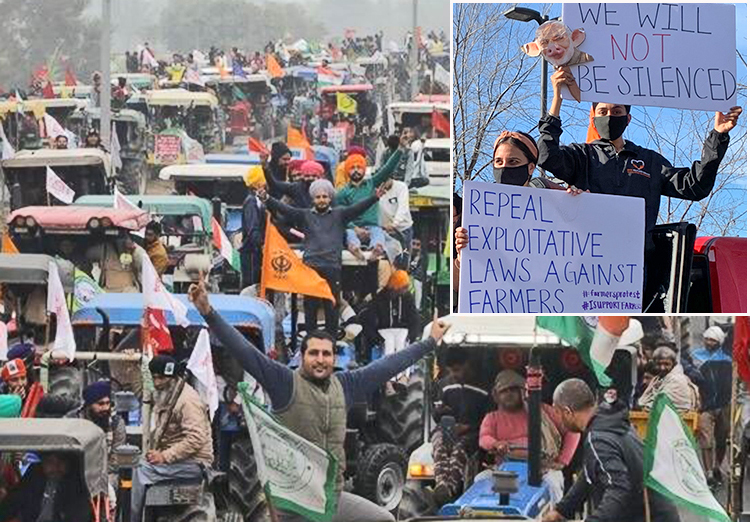Hundreds of thousands of working farmers are maintaining their protests around the Indian capital, New Delhi, determined to roll back laws aimed at crushing their livelihoods. The measures passed by Prime Minister Narendra Modi’s government would end state-guaranteed minimum prices for staple crops. They come after farmers’ incomes have declined for years, forcing many into deepening debt.
Up to 300,000 farmers are organized at the protest sites by nearly 400 farm organizations. This is the largest protest against the Indian government in decades and the biggest opposition Modi has faced since coming into office.
The protests started from the northern states of Punjab, where many are Sikhs, and neighboring Haryana, before spreading elsewhere.
Farmers’ unions are planning a massive tractor protest in the capital on India’s Republic Day Jan. 26 and are carrying out a recruitment drive in villages across Punjab signing up thousands.
The Modi government complains that farmers’ plans will spoil the traditional celebrations the government organizes on that day. It claims the farmers are “maligning the nation globally.”
Actions in solidarity with the farmers’ struggle continue to grow around the world. Over 500 rallied at the Sikh temple in Yuba City, California, Jan. 16.
A Global Day of Action in solidarity with the Indian farmers will take place Jan. 26, coinciding with the New Delhi tractorcade. In New York, a march will leave Times Square at 10 a.m. for the United Nations building.
“I urge workers and farmers in the U.S. to join these support actions,” Joanne Kuniansky, Socialist Workers Party candidate for New Jersey governor, told the Militant. “Working people all over the world have common interests.”
Camps sustained by growing support
A group of 25 men led by Faaroqi Mubeen from the Muslim Federation of Punjab volunteered for days to serve in the community kitchen at one of the New Delhi camps. “It is our responsibility to take care of the farmers,” he said. It is “the farmers who feed everyone.”
Irfan Jafri, a wheat, rice and soybean farmer who heads a local agricultural organization in Madhya Pradesh, brought 200 farmers from his village, spending two weeks in a camp. “During that time locals opened up their homes to us, Sikh groups gave us food, and we had a chance to meet farmers from all over India,” he told the press.
“The central government is wondering who is funding the protests,” 70-year-old Sadhu Ram from a village near Kaithal, Haryana, told the Times of India. “If they want to know, our help is coming from the ordinary villagers, who are contributing wheat, rice and sugar because they know the farm laws will affect livelihoods.”
Trailers of food and firewood keep arriving from collection drives held in nearby states. The camps provide kitchens, accommodation, and medical and laundry facilities.
Villagers are excited to take turns at the camp sit-ins. But “people need to be rotated to enable work like crop watering and cattle care to continue back home,” Pawan Maan told the same paper. “The villages will keep sending more people and the government will be forced to listen to us.”
Farmers are “fearlessly taking on the powerful government,” Surmeet Mavi, an editor of the Trolley Times, a daily newsletter published from the protest site, told the BBC.
Protests against the new laws by farmers from Uttar Pradesh, Madhya Pradesh, Rajasthan, Bihar and Uttarakhand to Tamil Nadu in the south have intensified in recent weeks. A thousand farmers made the three-day road trip north to Delhi from Kerala.
Talks between farmers and the government remain deadlocked despite the Supreme Court suspending Modi’s laws and offering to “mediate.”
Many family farmers in India faced increasing debts, even before the new laws take effect. In Punjab, the press reports three to four farmer suicides every day. Thousands of widows and other family members carrying portraits of farmers who took their own lives have joined the demonstrations.
As land is passed down from generation to generation, farms have become more subdivided. In the past 50 years the number of farms in India has doubled to about 146 million and the average size has halved to about 2½ acres.
In the eastern state of Bihar, minimum price supports were removed 15 years ago. Last year, while Punjabi farmers sold their rice at the state-mandated price of $25 per 100 kilograms (220 pounds), farmers in Bihar were forced to sell that for $16 on the open market.
The Indian rulers have their eyes on extending market prices across the country and reaping superprofits as state-backed price supports are removed. Small farmers can then be pushed out by larger scale capitalist production.


